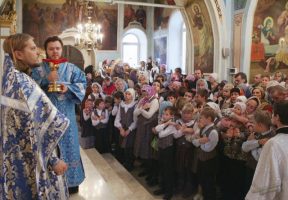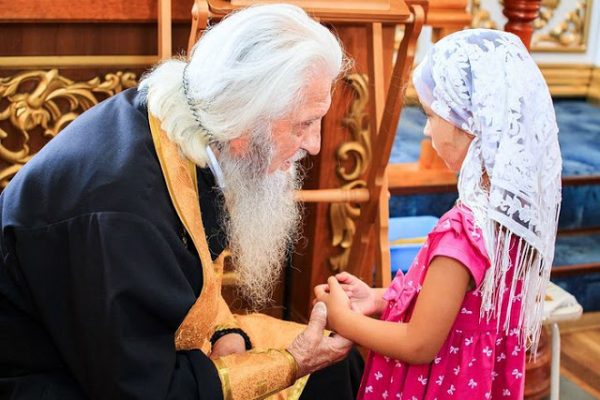When we talk about children in the church, we usually mean babies and toddlers — the youngest ones who cannot seem to sit still. That’s a big challenge for parents and for the rest of the parish. But what happens when those kids get a little older? We don’t talk a lot about what to do when your ten-year old declares that he just doesn’t see the point of church or when your eleven-year old says she just doesn’t want to go anymore. They’d rather just stay home and pray. God can hear us from here, right? What do you say to that?
I have friends who ask me this question, and they always assume that this isn’t a problem I would have, because I write about the faith so obviously my kids must love church! The truth is that every parent — priests, counselors, podcasters and teachers and everyone else — goes through this with their kids. It’s a very normal issue. Even kids who really like church and are excited about Jesus will sometimes question whether it’s really necessary to go this week. Adults go through it too — sometimes we’re tired, or just lazy, and we ask ourselves why we drag ourselves to church every Sunday.
It’s a good question, and I want to approach it in a few different ways: I want to look at practical things we can do to make going to church regularly a little less painful, and then we’ll think about the philosophical answers to the questions the kids are asking. Why do we go church? What are we accomplishing by going that we could not accomplish right here in the comfort of our own homes? Finally, I want to think about this in a larger sense — who are we as parents, and how is it that a child is taught to love God and seek after Him?
Practical Ideas
First, the practical angle. There are certain things that can make these arguments less frequent and easier to win:
— Get a job. If you child has a job in the church, like serving at the altar, or ringing the bells, or being an usher or greeter, or singing with the choir, they’ll be more likely to want to go to church. Also, when they ask you why you have to go to church today, you can say: Father is expecting you behind the altar, or we need to hear your voice. When your children know that they’re valued, active members of the parish, they understand that their presence is helpful and would be missed.
— Find some friends. When a child has friends in the parish, going to church means seeing their friends, and people generally like to see their friends. Take them to youth group events. Call that family with the nice kids and invite them over to dinner. Invite church kids to birthday parties. And if your church doesn’t have much of a youth group to encourage fellowship and friendship, get to work. Put one together. The more your children see that the church is a loving community, the less difficult it should be to get them there.
— Know what’s happening. If your church doesn’t have pew books, and this goes a hundredfold for those of you whose liturgies happen in languages your children don’t understand, go to an Orthodox bookstore online or in person, or go to Amazon or wherever you like, and buy copies of an appropriate liturgy book for your kid. It really helps if they can follow along. Now, different jurisdictions do things differently, so if you’re in a Russian church, find a Russian book, or in a Greek parish find a Greek book. I’m all for being Pan-Orthodox, but be aware that different jurisdictions include and omit different things, and translations vary. Talk with your priest, look around, and try to find something that closely follows what you’re actually doing in church. You might also consider an age-appropriate book about the liturgy, something that explains what is happening. Understanding helps. The liturgy becomes more meaningful and relevant to our lives when we know what it is that we’re doing.
Be consistent. If you wake up on Sunday mornings and then decide whether the family is going to church or not, you will probably see more resistance than those households who consistently attend church every Sunday. Kids are smart. They know what’s negotiable. If you attend church except when you’re especially tired or when last night went late or when there’s a good soccer game, then your kids know that if they give a good enough reason (or if they cause enough friction) you’ll bend and let everyone off the hook. On the other hand, if they know that only category 2+ hurricanes, acts of God, and profound illness will keep you home, they don’t argue as much. Oh, they’ll still argue sometimes, but the argument will be less frequent and easier to win.
What if they assert their God-given free will to not attend church? What do I say? Try this oldie but goodie: “How you’ll manage your relationship with God and the Church over your lifetime is yours, but while you’re living in this household, we all go to church.” That’s a very reasonable response. I have told my children many times that God entrusted me with the sacred and important job of stewarding them to adulthood, and I take it very seriously, and I’m going to do my best. That means that I have chosen to raise them in a church-going family. Their relationship with God is theirs, but the way that the family as a whole relates to God is something for which I will answer on judgement day, so I have to guide everyone as best I can until they come of age and (God willing) leave my home to set up their own.

Philosophical Arguments
Now, I’d like to spend some time thinking about philosophical responses to why we go to church. Kids will often say the same things many adults who stopped attending church say: God doesn’t need me to go to church. I can worship Him anywhere! I’ll just worship Him right here on this couch or while I hike on a nice mountaintop. I don’t need to worship in a church.
Let’s set aside the obvious problem that when we routinely skip church, we probably aren’t spending hours worshipping God in our own unique and solitary way. Odds are, we are watching Netflix or napping or chatting with a friend. We’re not actively worshipping all morning.
Philosophically, even if you are actively worshipping God on your couch, it would still be preferable if you could come to the liturgy with the rest of the parish.
While it’s true that we can pray anywhere and God can always hear us, there is something special about going to church. We’re not a passive audience who simply witnesses a priest worshipping; we are actively doing the work of liturgy. Sometimes we translate liturgy as “the work of the people” but I am told that it could be more accurately translated, “the offering of the people for the whole world.” Whether it’s work or an offering, the people are coming together to do something active that is useful to the whole world.
Every member of the church is equally important. Children are as important as adults; lay people are as important as priests. We all have different roles to fill and different jobs to do, but every member of the Church is very important, and is called to join together in this work of liturgy.
This work cannot be done alone. A priest cannot go to the church and simply do the liturgy without another person, because the Eucharist truly is “Communion” — it’s people coming together with one another, with the angels and Saints, and God. Communion cannot happen alone; it requires more than one to come together in love.
When the deacon says, “for peace on earth let us pray to the Lord”, he is not actually praying for peace on earth. He is leading the people, calling them to pray for peace on earth. If you don’t show up and actually pray for peace (saying, “Lord, have mercy” but also we would hope, actually meaning it as a prayer for peace), then the prayer isn’t offered. The people have to be there to offer the prayers — and it’s important that as many people as possible join together in offering up prayers, because prayer is effective and important.
When the people gather and sing the hymns and responses of the Church, we join the angels who worship God in song. The angels are performing the liturgy too (we call it the angelic liturgy), and we join them in it. If we are not there, we cannot join the angels in liturgy. Prayer at home is different — it is not always accompanied by an invitation to sing with the choir of angels, but every divine liturgy is always an opportunity to enter into this remarkable communion.
When we go to liturgy we are doing the important work of BEING the church.
We are gathering together to witness a miracle — a miracle that is promised to us whenever we gather in this way. In the Eucharist, Christ comes literally into the chalice; Christ comes to us, and we are invited to take Him into ourselves, the we may live in Him and He may live in us. Christ only comes to the chalice if someone joins Father at church; there must be a second person there. And Christ can only come into us through Holy Communion if we are there too — if we stay home, we are not offering ourselves up for transformation and we are not receiving the Body and Blood of Christ. Receiving Holy Communion changes us.
Notably, it wasn’t our idea to gather for liturgy. This is how God arranged things, this is how Christ established Communion at the Last Supper: knowing who we are and how we work, He showed us that in order to receive Him, we have to come together as a body. That’s how we are designed, and how communion works.
I sometimes tell the story about how I was frustrated when I first entered the Church that every time I thought I’d gotten a handle on all of the saints and the books and the ideas, someone would bring up another one I hadn’t heard of. I was so annoyed that I couldn’t know all of it. My priest laughed and said that God designs it this way on purpose: God gives us each a piece of the puzzle because He wants us to gather together to solve it. He is working toward our unity. He calls us to come together on purpose. We have to join together with each other in love as we work to join together with Him in love.
Community is very important. It has been said that ‘One Christian is no Christian’ because it’s only through community, through communion, that we can grow in love and become more like Christ. And that doesn’t just mean that you should hang out with your friends, get a like-minded group together and stay close. Christ calls on us to love our enemies, to sit and break bread with people who are different from us, who make us uncomfortable. The very fact that other people might annoy us, or that going to church means getting out of bed and out of our comfort zone, is actually an integral part of why it’s so important to go to church: we are being called out of ourselves, out of our natural self-centeredness. The only way we can serve Jesus is by serving other people. We can’t wash His feet or feed Him, but when we do this for the least of His sheep, we do it for Him. If we want to find Jesus, we need to look for Him inside other people and find Him there, and serve Him there.
We are saved in community, like it or not.
Strangely enough, faith is not a solitary, individual thing. Yes, I have my faith and you have your own; we each have our own relationship with God perhaps, but ultimately, we are called to worship together in love. Christ did not tell us to pray, “My Father, Who art in heaven” but to pray to “Our Father”, together. Further, Christ tells us that where two or more of us are gathered in His Name, He’ll be there. He’ll be present with us — when we gather in holy community, in His Name.
So there really is a difference between being in church and at home; we cannot pray the same way or worship the same way on our couches or on a hiking trail, no matter how breathtaking the mountains are and how inspired we feel. Pray at home and hike as you can, but know that it’s important that you come to church too. One does not replace the other.
Coming together as a community is important in a simpler way as well: we need support and love, and we cannot do that on our own. We need each other.
We could illustrate that with a story that you’ve probably heard before. It can be told in different ways and I don’t know where its true origin lies or who told it first, but it’s a great story and my sister-in-law recently reminded me of it.
A member of a twelve-step program (or perhaps of a church, or of a support group — insert any sweet community who relies on one another), who had been attending meetings regularly, stopped going. After a few weeks, his sponsor decided to visit him. It was a chilly evening and the sponsor found the sponsee at home alone, sitting before a blazing fire.
Guessing the reason for his sponsor’s visit, the sponsee welcomed him, led him to a big chair near the fireplace and waited. His sponsor made himself comfortable but said nothing. In the grave silence,he contemplated the play of the flames around the burning logs. After some minutes, the sponsor took the fire tongs, carefully picked up a brightly burning ember and placed it to one side of the hearth all alone.
Then he sat back in his chair, still silent. The sponsee watched all this in quiet fascination. As the one lone ember’s flame diminished, there was a momentary glow and then it’s fire was no more seen, it was cold and “dead as a doornail.”
Not a word had been spoken since the initial greeting. Just before the sponsor was ready to leave, he picked up the cold, dead ember and placed it back in the middle of the fire. Immediately it began to glow once more with the light and warmth of the burning coals around it.
As the sponsor reached the door to leave, the sponsee said, “Thank you so much for your visit and especially for the fiery sermon. I’ll see you at the meeting in the morning.” — Author Unknown.
We need each other to keep our sparks lit — just like on Pascha when we come outside before midnight. Father brings us the Light of Christ from the altar, and we pass it to one another. We receive that spark in community, one hand to the next, and then we head outside and we face the elements. Some years it’s mild and warm, and other years it’s stormy and cold. Sometimes in life, those winds just blow out our flames, and if we don’t have one another, we cannot relight them. The spark of faith and the spark of hope — these are flames that can be hard to keep lit, and in community, we can help one another keep going.

The Limits of Argument (aka The Hard Part)
As parents who want to raise up children who love God and who love the liturgy, our most powerful weapon is not argument.
We can talk for hours about reasons we should go to church, but it’s important to remember that you can’t argue someone to heaven. Deeper understanding of what the liturgy means is wonderful, but it’s intellectual. Real faith happens in the heart.
St. Maximos the Confessor said, “Just as the thought of fire does not warm the body, so faith without love does not actualize the light of spiritual knowledge in the soul.”
The thought of fire does not warm my body — it’s true. Knowledge about faith isn’t going to transform our souls unless it’s ignited by a real love for God. What we want for our children is not knowledge about the liturgy, but a love for the liturgy and for Christ. Our real goal is that they love God with all their hearts. We cannot achieve that with argument.
The saints tell us to speak less and to pray more; we should pray for God to kindle love in their hearts, so that they hunger for God each in their own way and pursue Him throughout their lifetimes.
What’s more, research tells us that when children grow up seeing parents who love Christ, whose participation in the life of the Church is fulfilling and fruitful, they tend to follow that example. And when they see parents who don’t really care about liturgy but who just show up at church because that’s the obligation, they take note, and they report that they saw churches that were “shallow” and “insincere”. As always, raising saints turns out to be the hardest job in town, because in order to raise a saint, we’re going to have to become saints.
So I think this may be the place to start: let’s get on our knees and ask God to ignite a great yearning love in our own hearts, and in the hearts of our children. Let’s ask God to grant us the gift of loving Him, of yearning to move closer to Him, so that we can all begin to yearn for liturgy and for the transformative grace of Holy Communion, together.
And then we’ll be patient, and give Him time to work. Remember that our end game is not to have the kids stop complaining by next Sunday; it’s to know that they’ll be reaching out to Christ through the years and into eternity.
We’ll get there.

















